Menu
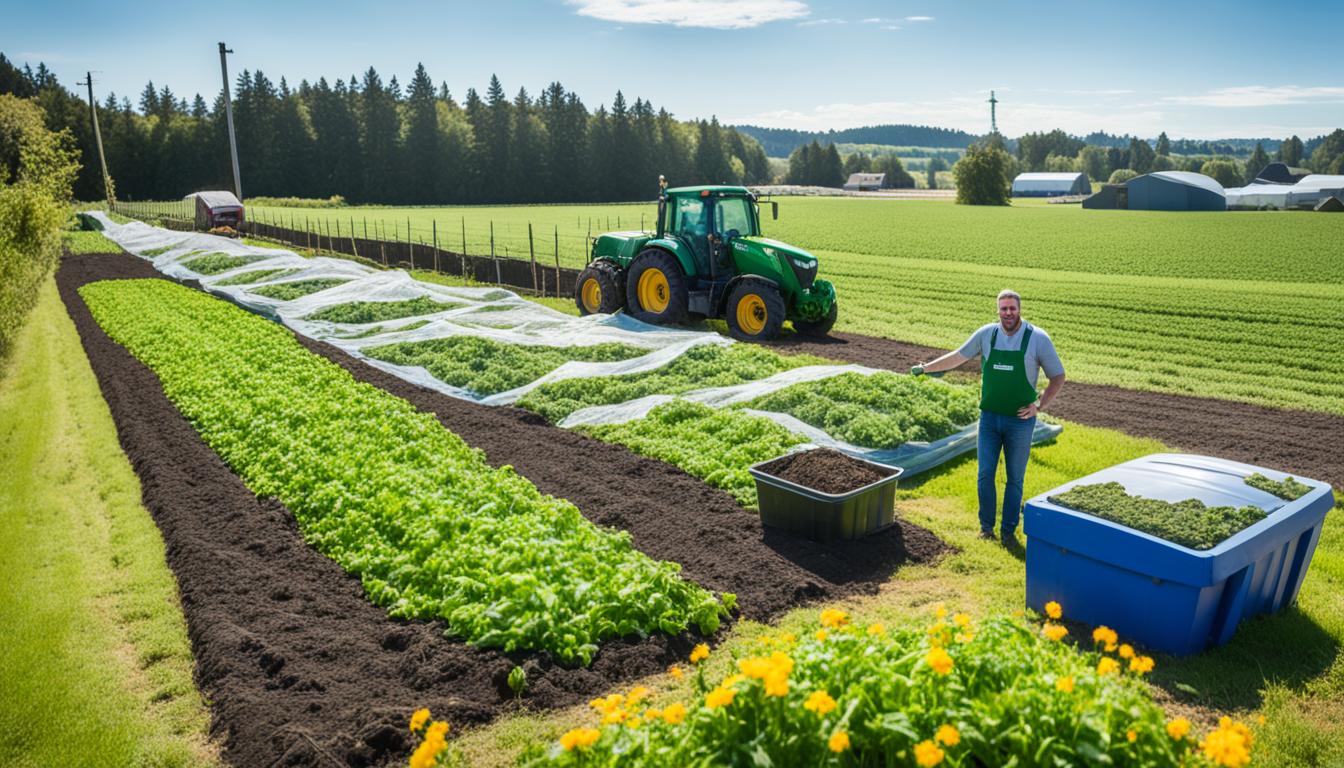
Did you know UK farms create about 0.5 million tonnes of non-natural waste yearly? This includes plastic wrapping and machinery. Now, there are new rules. The EC Framework Directive on Waste will cover farm waste soon. This pushes farmers to manage waste in a greener way . It’s a big step forward by the Environment Agency. They want to end old practices like burying waste on farms. They’re encouraging everyone to find better ways of handling waste.
The Environment Agency is working with Biffaward to help out. They’re doing research to make sure farms follow the law and to find greener ways to use resources. This change connects farming closely with the UK’s environmental rules. It brings farmers, rule makers, groups that protect nature, and those in the waste business together. The goal is to work as a team. This way, farmers can meet the new standards and work in a way that’s good for the planet.
The UK has big new rules on waste, covering many areas, like farms. These changes follow the EC Framework Directive on Waste, urging better handling of farm waste. The Waste Management (England and Wales) Regulations 2006, effective from May 15, 2006, are a key part of this push.
Starting May 15, 2007, those dealing with farm waste must follow new guidelines and be careful with hazardous waste. Farm waste is now seen as ‘controlled’ and must not be burnt or buried without a special permit. This rule only applies in England and Wales. It highlights how the UK Waste Regulations significance matters for the agricultural sector’s environmental impact.
I aim to show you the latest about dealing with waste on UK farms. We’ll cover the laws and ways to manage waste. Also, we’ll look at how other EU countries do it. We will propose a plan that fits for UK farms. Marcus Hodges Environment Ltd and others are helping.
This article explains why it’s urgent to manage farm waste better, as the EC rules require. We will check out the effects of older laws and recent changes. You’ll learn about the Environment Agency’s job and how the new rules help the environment. You’ll have a full picture of waste management guidelines UK for the UK agricultural sector.
The UK’s agricultural sector creates various types of waste. This waste includes packaging, plastics, and old machinery. Annually, it totals to about 0.5 million tonnes. This highlights the need for better management of farm waste.
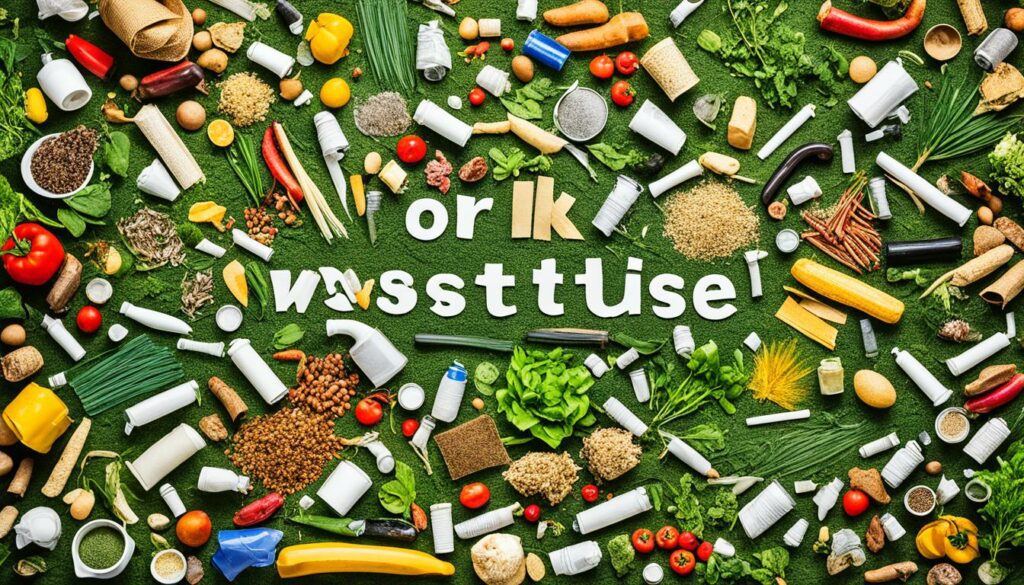
“Agricultural waste” refers to materials from farm activities. It involves fertiliser packaging, plastic films, and machine parts. Although farm waste is wide-ranging, we lack detailed data on many types. This makes finding solutions challenging.
Various forms of waste come from farms. Plastics, packaging, and machinery scrap are common. This waste collection is related to the number of agricultural holdings, which was about 240,000 in the UK in 1999.
This data shows the challenge of managing farm waste. It’s complex due to the many kinds of waste and ways it’s generated.
In the past, farm waste was handled simply, often on the farm. This was due to few rules about waste disposal. Common methods were burning, burying, or keeping waste on the farm. After 1997, farm waste stockpiling increased when a recycling scheme ended.
England, Wales, and Scotland are now working on better plans. They want to put more control on how farm waste is dealt with. This comes as retailers and producers are under more pressure to manage waste responsibly.
Here is a table showing the EU’s practices for different waste types:
| Waste Category | Percentage Treated in the EU | Preferred Management Practices |
|---|---|---|
| Mineral and Solidified Waste | ~75% | Recycling and Construction Use |
| Mixed or Ordinary Waste | 10% | Energy Recovery |
| Recyclable Wastes | 5% | Material Recovery – Metal, Wood, Paper |
It’s vital to overcome obstacles in dealing with farm waste. Doing so will help the environment and meet new rules better.
The way UK farms handle waste is changing a lot. Farmers will need to adjust to new rules that focus on reducing damage to the environment. This means they must stop using old ways of getting rid of waste, like burying it or burning it.
A big change is happening in UK farming. The UK yearly throws away about 0.5 million tonnes of non-natural waste. The usual ways of getting rid of it, such as burning or keeping it in piles, will be less okay now.
Instead, the new rules push farmers to find better ways to manage their waste. They should now choose what’s best for the environment over what’s easiest. The goal is to find cleaner ways to get rid of waste.
There are important, new rules that farmers must follow. They need to register with SEPA for special burns or if they want to use waste on roads. Also, for keeping plastic waste together, they need permission. Some rules let them handle small amounts of plastic more easily.
These regulations are about taking better care of the environment. They aim to make sure all farms are doing their bit in the right way.
Farmers are feeling the pressure to meet new rules and do better for the planet. They must figure out a mix of keeping waste at the farm and sending some away. This is to deal with waste properly now.
But, getting there might be hard at first because it can be costly. They’ll need to work together on some plans. This could help them cut down the waste or handle it better.
In the end, these new rules will push farms to be smart about waste management. It’s all about caring for the environment and following the law.
The details of environmental legislation UK greatly affect today’s farms. They include strict waste disposal laws and rules on water pollution. Farmers must work within these rules to meet national and local standards for eco-friendly farming. This is vital for using the land wisely and keeping it safe.
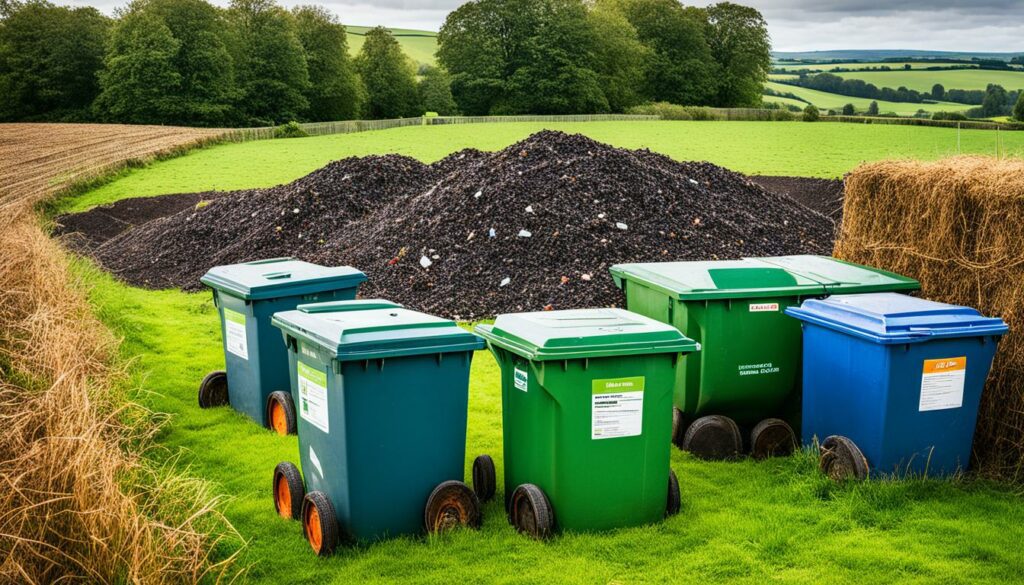
The UK’s waste disposal laws reach everywhere, from farms to nature. The Waste and Agriculture (Legislative Functions) Regulations 2022 cover England, Wales, Scotland, and Northern Ireland. These rules set out how to handle different types of waste, and groups like the Environment Agency make sure everyone follows them. Their goal is to protect the environment.
NVZ regulations are very important in the UK. They mark areas vulnerable to nitrates from farming. Around these areas, farmers have specific rules on fertilizers and manure use. This is to stop nitrates from harming the water. Following these rules makes farm practices better for the environment, including the water we drink.
UK farmers must meet the Farming Rules for Water to fight against water pollution. These rules are part of a big plan for the environment. They involve using fertilizers carefully, safe manure storage, and stopping runoff. The Environment Agency checks if farms are following the rules. By doing so, they help protect water and wildlife, supporting farming that lasts.
As a whole, the environmental legislation UK, from waste disposal laws to Farming Rules for Water, is crucial for green farming. By sticking to these rules, farmers do their part to safeguard resources. They also support country and EU goals for a healthier environment.
Good UK waste management guidelines are key to keeping the country green and clean. The Waste Management Plan for England works hard to cut down on plastic waste. It also looks at ways to make less mess on our planet. Every six years, these plans must be checked to be sure they’re up to date.
The UK wants to recycle more and throw away less. By 2035, the aim is to recycle 65% of our rubbish. A strategy from 2018 plans to use our resources better by 2050. It also hopes to stop making as much waste by then. Getting rid of rubbish and recycling more often is a big part of this plan.
The government has big goals for managing waste. They want to shake things up to recycle more and protect the environment. They’re working hard on several areas, including reducing food waste and making sure plastic can easily be recycled. The Environment Bill is key to these changes, setting new laws for how we handle our waste. It aims to make us better at reusing what we have.
Groups like county councils and parks keep an eye on how we deal with waste. They watch over activities like recycling metals and burning waste to make energy. These groups make sure our actions fit with the bigger plan. They also help cut the pollution caused by waste, getting us closer to the zero-emissions goal.
Local councils do their part too, following EU rules on what to do with our waste. They focus on strategies that are good for people and the planet. They work with health and environment experts to make sure we’re doing things right. Putting a spotlight on the best ways to manage waste helps everyone. It makes sure that farms and other places follow the right rules for a clean and eco-friendly country.
Recycling is vital for farms to operate sustainably. It brings big environmental benefits. More farming communities in the UK are starting to follow recycling rules. They want to manage their waste better. Let’s see why recycling agricultural waste is so important and what farmers are doing about it.
Recycling in at the farm helps reduce our carbon footprint. It means less waste goes in landfills, which the UK is aiming for as part of its Net Zero Strategy. In 2020, the UK’s waste emissions were about 25 million tonnes. This made up almost 6% of the country’s emissions. By recycling, we can really cut down on greenhouse gases.
Recycling can also save money. Farmers spend less on throwing away waste and on following rules about waste. It also means using old materials again, which helps the environment. For instance, the UK is working towards recycling or composting 70% of plastic packaging by 2025.
There are many ways UK farmers recycle. One way is through take-back schemes. Here, engineers and vets collect waste to make sure it’s properly disposed of. Also, there are special schemes for recycling silage plastics in places like Wales, Scotland, and Cumbria.
Facilities that turn waste into energy are also becoming popular. These aim to meet almost a third of Scotland’s renewable heat goal. Firms can work with different waste companies to find the best service for recycling. This way, they get the best deal, helping both big and small farms.
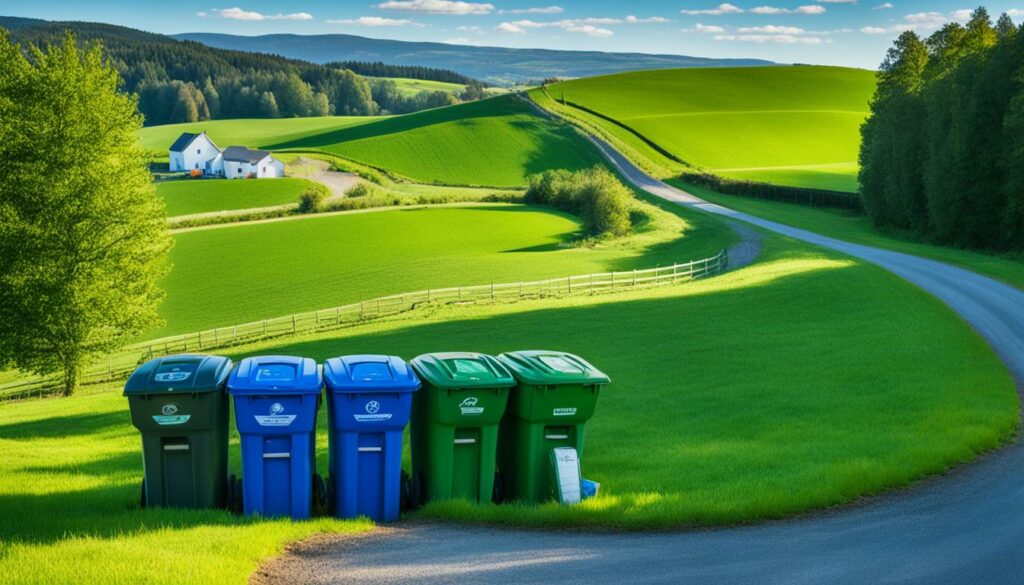
The UK has hundreds of thousands of farms, and they need to recycle. Even though there were issues with old recycling schemes, new subsidised ones are helping. These days, farms know how to handle waste better.
Farms can store plastic for recycling for up to three years. This flexibility is good for both the farmers and the environment. It helps farms meet the UK’s big sustainability goals.
The table below summarises some of the significant data regarding the agricultural industry’s impact and recycling potential:
| Year | Data |
|---|---|
| 1999 | Approximately 240,000 agricultural holdings in the UK |
| 2020 | 25 million tonnes of CO2e from waste emissions |
| 2025 | Target of 70% plastic packaging recycled or composted |
In summary, making recycling rules UK-wide is a huge boost for the planet. By recycling, farms keep in line with tough waste laws. They also help move the farming industry towards a greener future.
The Environment Agency in the UK works hard to keep farming practices sustainable. They oversee farms to make sure they follow waste regulations. This helps reduce the impact of farming on the environment.
The agency conducts inspections on farms nationwide. In 2022, they checked 3,482 farms. Shockingly, 39% of them didn’t meet all water rules. This watchful eye ensures farms protect the environment and follow the law.
The agency also has officers who check on industries like water and waste. They do detailed inspections and guide these businesses to be more environmentally friendly.
The Environment Agency is strict about enforcing waste laws. They took 114 companies to court in 2022, fining them £4.8 million in total. This tough approach shows they are serious about stopping waste crimes.
| Year | Total Farm Inspections | Farm Non-Compliance Rate | Total Prosecution Cases | Fines Collected (£) |
|---|---|---|---|---|
| 2021 | 3,500 | 37% | 120 | £4.5 million |
| 2022 | 3,482 | 39% | 114 | £4.8 million |
The Environment Agency also covers other industries like oil and nuclear. They make sure these industries protect the environment from start to finish. This includes preventing pollution and maintaining high-quality air, land, and water.
They keep an eye on pollution incidents, which decreased from 561 to 504 from 2021 to 2022. However, almost half were from activities without the right permits. This shows the challenge they face.
With thorough checks and strong actions, the Environment Agency helps the UK farm sustainably.
The UK’s farming world is troubled by an increase in sending away dirty waste. The Environment Agency catches more and more of this waste before it leaves. This problem needs fixing quickly.
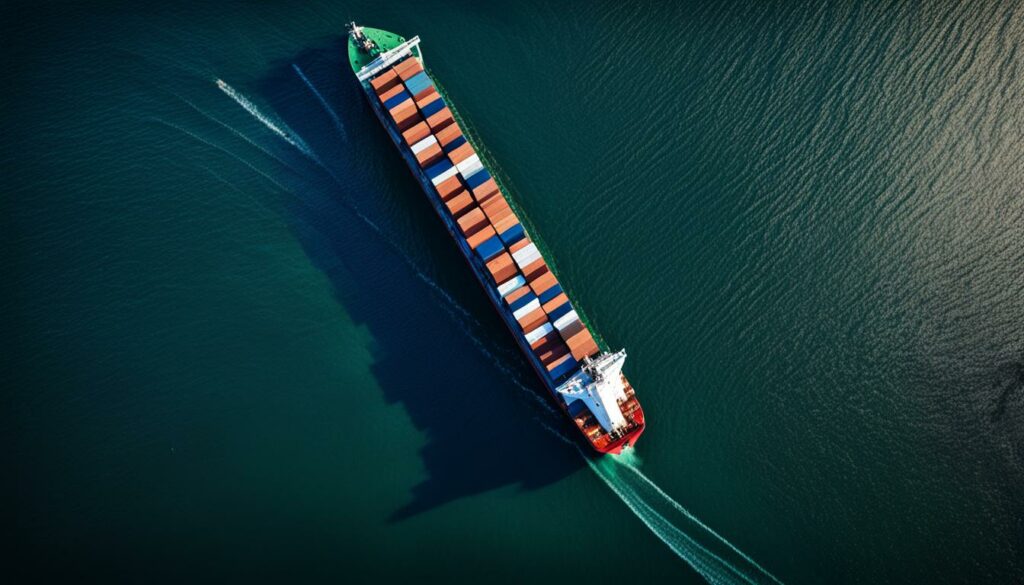
Much more dirty farming waste, especially plastic, is getting stopped at UK ports. Things like silage wrap are trying to go to other lands. Many illegal shipments were found last year. This shows we need to watch more to stop illegal waste export UK.
The Environment Agency is working hard to stop this. They have teams all over the UK. They’re working with the Waste Compliance Taskforce.
Farmers and farming companies need to be very careful. They should check that waste firms have the right papers. They should keep good records of the waste. Also, they must check where the waste is going and make sure the waste firm is authorised.
You need permission from the sending and receiving country, and any in between, to move dirty farming waste legally.
People who send waste illegally could face big punishments, even if they’re not the ones who made the waste. The Environment Agency keeps looking out for those who try to export waste without permission. Everyone involved can be in trouble. This shows how important it is to follow the rules for waste disposal.
The Waste Compliance Taskforce and campaigns like Right Waste Right Place are here to help. They give advice and help you follow the law, avoiding illegal waste dealings.
The Environment Agency and the Waste Compliance Taskforce, along with careful checks and lots of attention, are stopping harmful waste exports. Working together like this is key.
In the UK, farming is changing fast. More and more, farmers are using ways that protect our planet. There are about 240,000 farms across the country. Each one, whether small or large, plays a big part in keeping our land green. By farming in a way that doesn’t harm the environment, we make sure our farms can thrive for the long term.
Around 0.5 million tonnes of non-natural waste is produced by farms every year. This waste comes from things like packaging, machinery, and animal health products. It’s a big challenge for the farming sector to handle all this waste in a way that’s not harmful to the earth.
Farmers often deal with waste by burning it, burying it, or keeping it in piles. They may also put it in with normal household rubbish. This old way of managing waste has been the norm because farm waste was not always considered the same as regular trash. But things are starting to change. Now, farmers can give their waste to be recycled. This is thanks to programs that help with getting rid of certain kinds of waste in safe ways.
Since a key program to recycle plastic waste ended in 1997, farms have been piling up a lot of plastic. New rules, though, might mean farms have to be careful about their waste. These rules focus on stopping pollution and making sure wastes are handled in better ways. The idea is to move towards using and getting rid of waste in ways that are good for the earth. Changes like these are crucial for the future of farming.
Doing farming the sustainable way helps the environment and makes running farms easier. By following green goals, the farming sector helps create a better future for all. This is good not just for our planet but also for the long-term success of farming.
| Aspect | Current Status | Proposed Change |
|---|---|---|
| Waste Recovery | Increasing through specific schemes | Extension of comprehensive waste controls |
| Plastic Stockpiling | Widespread due to ceased national schemes | Revived and improved recovery programmes |
| Waste Management | Predominantly on-farm burning and burial | Integrated on- and off-farm options |
By switching to sustainable methods and better waste management, UK farming can become greener. This is not only important for our environment but also for making sure farms can keep growing. It’s about protecting our planet and ensuring farming has a future.
In the UK, we know it’s important to manage waste well. To help with this, there are many schemes to recycle farm packaging and agricultural plastic. Since 1997, businesses have had to help with recycling costs. This makes sure we use waste in a sustainable way in farming.
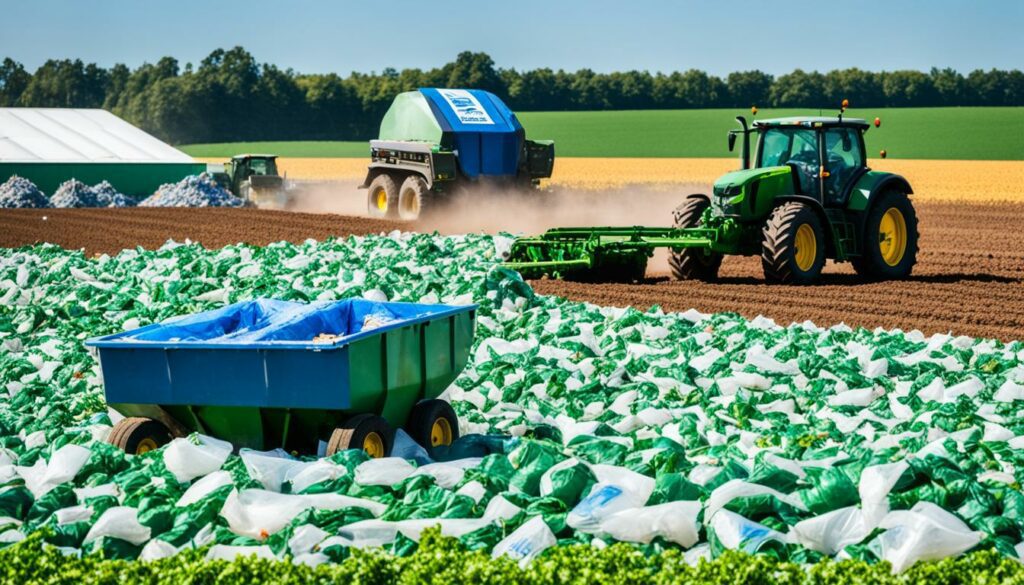
The UK uses Packaging Recovery Notes (PRNs) to manage waste. Companies that make, use, or sell packaging must pay for recycling. They need to buy PRNs from approved recycling companies to show they meet their recycling goals. These goals change each year and depend on the kind and amount of packaging used.
Four types of businesses share the work:
About 20 compliance schemes are ready to help companies do what they need. Every business needs to sign up with the Environment Agency. They must do this by April 7th each year to follow the waste recovery rules.
One good example is Scotland’s Deposit Return Scheme (DRS). Here, people pay 20p extra on single-use bottles and cans. This money is given back when the containers are handed in. Although it was meant to start in July 2022, the scheme has been delayed several times. The start may not happen until 2028/29. Still, its aim is to boost recycling and cut down on waste from farms.
In Wales, from September to November 2023, Digital DRS trials were done with 1,200 houses. These tests showed how using technology in recycling can be very helpful. People could send back cans and bottles from home, drop them off in shops, or use special machines. London plans to try a similar system soon.
Scotland also requires online shops and sellers from afar to take back empty bottles and cans. This rule means it’s easier for people to recycle these items. It shows a good way to encourage more recycling in farming and to inspire the same in the rest of the UK.
| Scheme | Region | Status | Details |
|---|---|---|---|
| Deposit Return Scheme | Scotland | Delayed to 2028/29 | 20p deposit on single-use containers; refund upon return |
| Digital DRS | Wales | Completed Trials in 2023 | 1,200 households participated; multi-channel recycling options |
| Future DRS Trial | London | Planned | Assessing feasibility in an urban setting |
Handling hazardous waste on farms is crucial and must follow strict rules. It’s important to manage farm chemical disposal carefully to protect the environment. Since 2005, farms in England and Wales must tell the Environment Agency if they make over 500kg of hazardous waste. They need to give a special code to waste contractors, keep detailed records about the waste, and hold onto these records for three years.
“Effective handling of hazardous materials, such as pesticides and veterinary medicines, aligns with broader environmental risk management goals,” says Environment Agency spokesperson.
Every year in the UK, a lot of plastic waste is produced by farming. For example, there are about 32,000 tonnes of plastic that was used for packaging. And there are around 103,500 tonnes of plastic that was not used for packaging. These big amounts show why it’s so important to follow the hazardous waste rules. These rules help control how farms get rid of chemicals in a safe way.
| Year | Regulations and Statistics |
|---|---|
| 2003 | – 201,926 agricultural holdings; 86% producing waste oils; 93% of agricultural waste consists of manure and slurries. |
| 2005 | Hazardous Waste Regulations came into effect; |
| Each year | 135,500 tonnes of agricultural plastic waste produced in the UK. |
The Duty of Care regulation makes farmers responsible for their waste. They must dispose of farm chemicals correctly to avoid fines and other problems. Many companies across the country can help farmers do this. They provide support to make sure farms meet the strict rules about managing waste.
Farmers need to know about the Hazardous Waste Directive 91/689/EEC and the List of Wastes Decision. These laws show what counts as hazardous waste and how to handle it. Every three months, farmers have to report on what they’ve done with their waste to the Environment Agency. This shows that they are being open and responsible. The Hazardous Waste Directive fits with many EU rules to protect the environment well.
Managing waste well is key for farms to run in a way that’s good for the environment. But, there’s a big challenge. Many farms face struggles because of the high cost and the difficulties to deal with a lot of waste. Knowing these problems helps farms find ways to deal with their waste better.
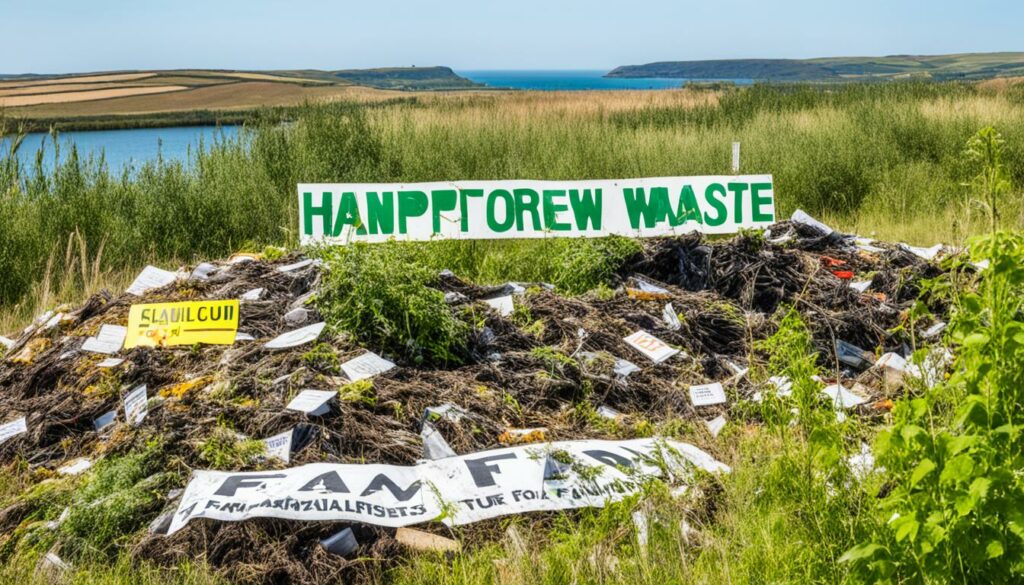
The money side of waste management is very complex. In the UK, building things uses lots of resources, about 400 million tonnes a year. Sadly, 100 million tonnes of this is wasted, and 25 million tonnes of that waste ends up in landfills. This carelessness costs the industry £1 billion a year.
But, the problem is even bigger with food waste. Every year, about 9.5 million tonnes of waste come from food, where homes create most of it. Sadly, less than half of the homes in England can dispose of food waste separately. This is unlike Wales, where almost all homes can do so. These money problems make it hard for farms to deal with waste well.
There are also many issues in physically dealing with waste. In building, for example, tight schedules don’t leave much time for waste management. The building industry creates around 32% of the UK’s waste, which is a lot more than what homes make. This rush makes throwing away waste expensive, with 25 million tonnes ending up in landfills each year.
Problems also come from not having firm support from key players like designers and clients. In the past, throwing away things was less expensive than finding other ways. Even with high landfill taxes set by the UK, this old way of thinking still hangs around. Solving these physical challenges needs careful planning for successful and earth-friendly waste management.
Europe leads in making positive steps in waste management. For example, Austria, Slovenia, Belgium, and Germany are doing well. They achieve more than 60% success in managing food waste. World over, new rules and encouragements have led to a 15% increase in how much households recycle.
| Country | Bio-waste Capture Rate |
|---|---|
| Austria | 60% |
| Slovenia | 60% |
| Belgium | 60% |
| Germany | 60% |
The UK can learn from these examples. By using similar plans, farms can get over money and physical challenges. This means they can be better for the environment while running their farms.
The EU’s various approaches to agricultural waste management are key. They show how to create effective strategies in the UK. Member states have different waste policies. They provide lessons and best practices for our work.
EU countries like Germany and Austria have set high recycling targets. They have achieved over 60% recycling for everyday waste. This is above the EU’s 2030 goal. They use strict policies and incentives to increase recycling.
Sweden and the Netherlands have done well in cutting landfill use. By 2022, Sweden had less than 1% of its waste going to landfills, beating the 2035 EU goal. They use waste-to-energy methods and have high landfill taxes.
When analysed, there are big differences in how EU states manage waste. For instance, Belgium sends a lot of its waste abroad, while Slovenia focuses on internal recycling. In 2022, the EU sent 32.1 million tonnes of waste out. 39% went to Türkiye.
In February 2024, new rules to fight illegal waste exports were put in place. They aim to keep waste management environmentally friendly and ensure the EU’s waste rules are followed. A resolution in February 2021 also set goals for a more eco-friendly economy by 2050, with steps to cut material use by 2030.
| Country | Waste Generation (tonnes) | Recycling Rate (%) | Landfill Rate (%) | Major Waste Export Destination |
|---|---|---|---|---|
| Germany | 450 million | 65% | Switzerland | |
| Sweden | 100 million | 50% | UK | |
| Netherlands | 120 million | 55% | 5% | Türkiye |
| Belgium | 60 million | 58% | 3% | India |
Analysing EU waste management highlights the best practices’ mix. This includes strict laws, economic support, and recycling efforts. The UK can adopt these great strategies for its agriculture waste.
To learn more about how the EU manages waste sustainably, check out this link.
Creating a strong UK farms waste management strategy relies heavily on leadership. Farm owners must lead the way to meet waste rules and eco targets. They should aim for a 65% recycling rate for town waste by 2035. It’s vital to follow the Net Zero Strategy. This means aiming to stop using landfills for biodegradable waste by 2028.
Farm top brass must push for green waste handling. This includes dealing with the half a million tonnes of man-made waste each year. They should look into options like collecting bio-waste separately and using new tech for leftovers.
Organisations like Green Alliance say cutting back on waste can lower pollution. It can also boost a circular economy. This supports goals from the 15th UN Conference on Biological Diversity.
Setting up a good plan means ensuring top-notch recycling. It also means pushing for ways to use resources more wisely, linked to UN Goal 12. Before making a plan, look at how much waste a farm makes. Also, look at waste from business, building work, and digging up land.
Begin with projects like refund schemes for empty drink containers. These can up recycling and cut down on trash. Also, think about dealing with waste nearby to make things run smoothly.
Staying on top of how waste plans work is a must. In 2020, waste was almost 6% of the UK’s pollution. Watching closely can dial this back. It includes checking on dangerous waste, getting and sending waste out, and if the area needs more waste sites.
This helps farms tweak their ways based on facts. They stay in line with UK waste rules and help farming stay green.
The UK Waste Regulations form the rules for dealing with waste from farms. They make sure that waste is handled well to protect the environment. This includes following certain steps, such as reducing waste use, properly disposing of waste, and meeting legal rules.
New rules from the European Commission include farming waste in their scope. This change demands better waste management from farms, fitting the environment. It focuses on following laws correctly and keeping the surroundings safe.
UK farms produce waste like packaging, plastics, and old machinery. Each year, this comes to about 0.5 million tonnes of material.
Disposing of farm waste has often involved burning, burying, or saving it in a pile. Sometimes, waste was even mixed with household rubbish. But now, these ways are being looked at again because of new waste laws.
There’s a plan to stop burying farm waste and to push for better waste handling methods. These changes will come from the Waste Framework Directive. It aims to increase following waste rules and use better methods of getting rid of waste.
Laws on waste disposal, areas prone to nitrates (NVZs), and rules for water on farms are crucial. They guide how farms fertilise fields, look after animals, and avoid polluting. These rules help farm practices stay eco-friendly and safe.
The UK’s waste rules stress on safe and green waste handling for all industries, farming included. They aim for less environmental damage and better waste management. These guidelines help farms make less mess and handle waste correctly.
Making farms recycle more means they stay within waste rules and are kinder to the environment. This includes collecting and dealing with items like plastics and metal the right way. It’s good for the Earth and it keeps waste from piling up in landfills.
The Environment Agency keeps an eye on farms to make sure they’re managing waste properly. It does checks and makes sure farms stick to waste laws. It’s all about keeping the environment safe from harm.
Sending farm waste abroad illegally is a growing problem. The Agency fights this by checking that waste is managed right. It supports groups that aim to stop illegal waste exports too.
Being smart about the resources farms use and how they use them helps the Earth. It helps farms keep going strong for a long time. This supports wider efforts to look after the environment well.
These schemes are put in place to collect and recycle packaging and plastic films from farms. They make sure farm waste is handled well and lessens harm to nature. By following a set plan, these efforts have shown they can work well.
Farms must follow UK law when getting rid of dangerous waste like pesticides. These laws lower the risk of harm to the environment. They help farms make sure they’re being careful and meet strict eco rules.
Economic costs and difficulties in collecting and moving waste make it hard to handle properly. Finding ways to cut costs and make waste management better is necessary. This helps farms run their waste operations in a smoother way.
Studying how other countries in the EU deal with waste can help the UK do better. Sharing good ideas and solutions helps make waste management here more effective. It’s a way to learn from others to improve our own waste practices.
Creating a good plan for waste on farms involves leading, planning, and checking how things go. This makes sure waste plans fit with UK laws and goals for saving the planet. It’s about making every part of waste management work well together.